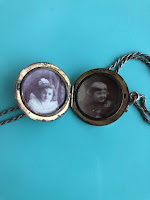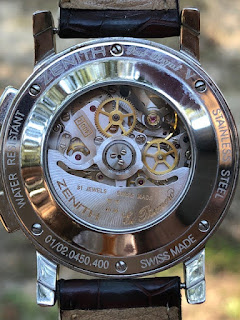Be the friend, not the thief
 During these turbulent times when so many of us are experiencing grief and outrage over what has been taken from us, Maria Vesperi’s story of loss has a particular resonance. It is a tale that carries an important message about the pain of loss, but also about the power of healing. The story has a bad guy: a thief who breaks into a house and steals silver pieces. Each piece holds a precious memory and each loss is painful. But the story also has a good guy: a friend who sees the pain her friend is experiencing and decides to do something about it. She gives again.
During these turbulent times when so many of us are experiencing grief and outrage over what has been taken from us, Maria Vesperi’s story of loss has a particular resonance. It is a tale that carries an important message about the pain of loss, but also about the power of healing. The story has a bad guy: a thief who breaks into a house and steals silver pieces. Each piece holds a precious memory and each loss is painful. But the story also has a good guy: a friend who sees the pain her friend is experiencing and decides to do something about it. She gives again. We are especially proud to present Maria Vesperi’s story since the piece of jewelry that has adorned our Facebook page since our launch belongs to her.
"The gold locket was handed down from my grandmother to my mother to me," Maria explained when we asked her about the origin of the locket. "It can be dated to1908 by the studio photos taken when my mother was two years old and my uncle was six. The inside edges are worn from frequent opening, but the burnished outside of the pendant is beautifully engraved with my grandmother’s initials on one side and the first letter of her maiden and married names entwined on the other."
We hope you are as touched by Maria's jewelry story as we were.
Stay safe and remember: Be the friend, not the thief.
“Something really important to me had been taken away”
I don’t think I’m a very materialistic person. I’ve never felt that way, you know. The jewelry that I have is not expensive jewelry. I was never into diamonds or gold or anything like that, but when I was a kid I admired certain pieces of jewelry my mother had. She didn’t wear jewelry much, but some that she had belonged to her mother and as I got older, she started giving me some pieces. I don’t know if she figured out I was going to be an anthropologist way back when, but she always gave me international things, things from different countries that had stories and, you know, that was really great. So I had jewelry from her and I had jewelry from my daughter -- when she got a little bit older she started giving me pieces -- and, of course, from my husband. So certain pieces I had were always really special. Usually, they marked something or they were given to me for an occasion.
So one Christmas a few years ago, we went away and when we came back we realized that someone had stolen things from our house. They only took silver. They took silver candlesticks that had belonged to my grandmother. They took a silver tray that had belonged to my husband’s aunt. And then I went upstairs and found my jewelry box.
They had taken all the silver jewelry they could find. It wasn’t that much but the pieces they took were all really special. The first silver gift my husband ever gave me from the first trip we took together to Mexico for research. It was just a silver bangle but I considered it really special, really important. The other missing piece that really sticks out to me was a silver bracelet my mother had given me when I was a kid. It had been given to her by her brother. Her brother was her favorite person really and one of my favorite people, too. After he passed away when I was 15, my aunt, his wife, gave me the matching piece, a necklace. It was a set. So I happened to have the necklace with me, but not the bracelet. When I came back, the bracelet was gone. I was really maybe, I don’t know, out of proportion upset about this. It wasn’t about the stuff, but it was the idea that these things that symbolized something really important to me had been taken away.
Since then a lot of jewelry that I used to wear, I don’t wear anymore. I just put the pieces away because I’m afraid to lose them. I just keep them put away. I don’t think that’s a very healthy attitude and I’m not really sure what it means, but losing those things really…. I know it doesn’t mean that my relationship with the people changed, either living or dead, you know, but it’s just these were things that someone had made the effort to give me, to pick out and give me, and I don’t have them anymore.
One other thing. I have a close friend — we have been calling each other adopted sisters for 20 plus years now — who said one year, “I’m gonna give you something really old from my family.” She gave me a tall, solid silver bowl that was probably from the 1700s. That also was stolen along with everything else. It was on our dining room table. That was just heartbreaking and for her, too. And I felt really horrible about it. But what did she do? She gave me something else. She gave me this, which I really don’t know the history of, but she said it’s very old and it’s worth a lot of money. And so I never wear this. I just take it out and look at it sometimes. She just wanted me to have it.
 MARIA D. VESPERI, a cultural anthropologist, is a professor at New College of Florida in Sarasota. From 1981-93 she was on the staff of the Tampa Bay Times and served as a trustee of the Poynter Institute for Media Studies in St. Petersburg from 1995-2015. She holds a doctorate in anthropology from Princeton University, based on research in St. Petersburg that contributed to her book, City of Green Benches: Growing Old in a New Downtown. She also co-edited Anthropology off the Shelf: Anthropologists on Writing and The Culture of Long-term Care. Her current book project compares ethnography and narrative journalism.
MARIA D. VESPERI, a cultural anthropologist, is a professor at New College of Florida in Sarasota. From 1981-93 she was on the staff of the Tampa Bay Times and served as a trustee of the Poynter Institute for Media Studies in St. Petersburg from 1995-2015. She holds a doctorate in anthropology from Princeton University, based on research in St. Petersburg that contributed to her book, City of Green Benches: Growing Old in a New Downtown. She also co-edited Anthropology off the Shelf: Anthropologists on Writing and The Culture of Long-term Care. Her current book project compares ethnography and narrative journalism.





Comments
Post a Comment